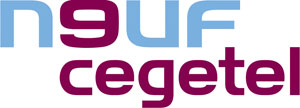
Communications in Gibraltar comprise a wide range of telephony systems, Internet access, broadcasting and satellite control. There is also printed and online media. Regulation of telecommunications and broadcasting are the responsibility of the Gibraltar Regulatory Authority (GRA), established by means of the Gibraltar Regulatory Authority Act in 2000.
Plain Old Telephone Service (POTS), or Plain Ordinary Telephone System, is a retronym for voice-grade telephone service employing analog signal transmission over copper loops. Originally POTS stood for Post Office Telephone Service as early phone lines in most parts of the world were operated directly by the local Post Office.

The Proximus Group is a provider of digital services and communication solutions operating in Belgium and international markets. In Belgium, the company offers its main products and services under the brands Proximus, Scarlet, and Mobile Vikings. The Group also operates in Luxembourg as Proximus Luxembourg SA, with the brandsTango and Telindus Luxembourg, and in the Netherlands as Telindus Netherlands. Internationally, activities are carried out by BICS and Telesign. Proximus Accelerators is the ecosystem of IT partners Be-Mobile, ClearMedia, Codit, Davinsi Labs, Proximus Spearit and Telindus.

KPN is a Dutch telecommunications company. KPN originated from a government-run postal, telegraph and telephone service and is based in Rotterdam, Netherlands.
Telephone numbers in Japan consist of an area code, an exchange number, and a subscriber number.
A naked DSL, also known as standalone or dry loop DSL, is a digital subscriber line (DSL) without a PSTN service — or the associated dial tone. In other words, only a standalone DSL Internet service is provided on the local loop.
Proximus is the largest of Belgium's three mobile telecommunications companies and is a part of Proximus Group. It competes with Orange Belgium and Base.

Telenet Group N.V. is the largest provider of cable broadband services in Belgium. Its business comprises the provision of analog and digital cable television, fixed and mobile telephone services, primarily to residential customers in Flanders and Brussels. In addition, Telenet offers services to business customers all across Belgium and in Luxembourg under its brand Telenet Solutions.

SFR is a French telecommunications company. It is both the second oldest mobile network operator and the second largest telecommunications company in France, after Orange.

Base is the third largest of Belgium's three mobile telecommunications operators. It is a subsidiary of Telenet. It competes with Proximus and Orange Belgium. It was previously owned by KPN and sold to Telenet in 2015.
Numericable was a major French cable operator and telecommunications services company. Numericable was originally created in 2007 from the merger between former competitors Noos and NC Numericable networks. Numericable Group SA was founded in August 2013 to act as the parent company of Numericable group companies and to offer its shares on the stock exchange. The company provides cable broadband services in France, Luxembourg and Portugal, offering digital and analog television, Internet, and phone services to homes. From 2008, Numericable also offered mobile telephone services to its customers.

Neuf Cegetel was a French wireline telecommunications service provider and a mobile virtual network operator (MVNO). It offered various telecommunications services to consumers, enterprises and wholesale customers, ranking second in the country in annual revenues. It was legally established in 2005 following the completion of the merger between Neuf Telecom and Cegetel. As of June 2008, the company became a wholly owned subsidiary of SFR, and the brand disappeared commercially.
Internet in Belgium has a high level of adoption and engagement, with a 93% uptake rate among individuals as of 2022, higher than the EU average of 89%. The country is on par with the EU average regarding digital skills, with 54% of its population having at least basic digital competencies. Illustrated through initiatives like the BeCentral digital campus, Belgium has created programs to boost digital literacy, which has trained over 425,000 students since 2017 to narrow the digital skills gap.

A telephone number in Belgium is a sequence of nine or ten digits dialed on a telephone to make a call on the Belgian telephone network. Belgium is under a full number dialing plan, meaning that the full national number must be dialed for all calls, while it retains the trunk code, '0', for all national dialling.
Television in Belgium was introduced in 1953 and began with one channel each in Dutch and French. The country is heavily cabled, with 93% of households watching television through cable as of 2003.

Scarlet offers fixed telephony, digital television, fixed Internet connections and mobile subscriptions for private consumers.
The mass media in Belgium is characterized by its diversity due to the linguistic divide in the country.
BICS is active in digital communications, cloud communication services, mobility and IoT for telecom players, Virtual Network Operators, service providers, enterprise software providers and global enterprises. It is a subsidiary of Proximus Group. The company was founded in 1997 and is headquartered in Brussels, Belgium with sales offices and Service Operation Centers worldwide, including Dubai, Singapore, Bern, San Francisco and New York. BICS provides services across more than 200 countries, carries around 50% of the world's data roaming traffic and partners with more than 500 mobile operators. In 2021 BICS carried over 20.8 billion minutes of international traffic and generated revenues for 999 million Euros.









